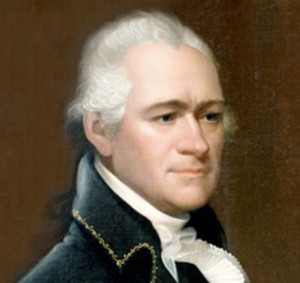Constitution
Commerce Clause, plain and simple

The Constitutional controversy initiated by the Health Care Bill has brought the Commerce Clause in the Constitution back into public view. It simply states:
The Congress shall have Power … To regulate Commerce with foreign Nations, and. among the several States, and with the Indian Tribes;”- U.S. Constitution, Art. I, § 8, cl. 3
While those 16 words seems simple enough, the people we have elected to represent us seem to have a great deal of trouble understanding them. As far as our founders were concerned, this was a very practical clause that gave the central government the ability to keep trade flowing throughout the new nation. They wanted to guard against unrealistic regulations imposed by any state that could impair the flow of trade throughout the nation.
Alexander Hamilton explains the Commerce Clause
To explain the proposed Constitution in particular to the ratifying convention in New York, whose governor opposed it, Alexander Hamilton, John Jay and James Madison wrote a series of 85 articles that were published in New York City newspapers under the pseudonym of Publius. These essays became known as the Federalist Papers.
Federalist No. 11 by Alexander Hamilton explains the Commerce Clause in the Constitution. It is entitled: “The Utility of the Union in Respect to Commercial Relations and a Navy.” In this essay he stated:
An unrestrained intercourse between the States themselves will advance the trade of each by an interchange of their respective productions, not only for the supply of reciprocal wants at home, buy for the exportation to foreign markets…Commercial enterprise will have much greater scope from the diversity in the productions of different States. When the staple of one fails from a bad harvest or unproductive crop, it can call to its aid the staple of another.
Hamilton went on to explain that without a union between the States that trade would be less successful; would be fettered and interrupted and narrowed by many causes.
The 16 words of the clause and the intentions of the founders would hardly seem like an appropriate subject for a present-day article. The words in the clause are clear and the essay by Hamilton makes the intention of the clause abundantly clear. Unfortunately, it is an appropriate subject matter when you have a group of nine elite judges deciding whether or not the Commerce Clause can be used to justify Obamacare.
The Commerce Clause could fix Obamacare
[ezadsense midpost]
Here’s the question: Can the Commerce Clause force people to buy something?
Here’s the irony: The Commerce Clause can correct one of the problems with healthcare – the problem of not being able to buy something across state lines. More irony – that is not one of the objectives within Obamacare. Here in New Jersey where healthcare premiums soar to unprecedented heights, buying across state lines would provide competition between carriers and allow citizens to buy or not to buy the product of their choice. That choice doesn’t exist; healthcare as written does not address the issue as it could with proper reliance on the Commerce Clause; and the clause is being perverted to accommodate the man now occupying the White House’s personal agenda.
- Question: What will the United States Supreme Court decide?
- Answer: Whatever their ideology dictates.
Once again, monumental decisions that will affect the lives and prosperity of many of our citizens will not be rooted in the Rule of Law prescribed in our founding documents, nor will those decisions be based on the clear intentions of our founders. They will be based on political ideologies that have morphed this nation into something that would be unrecognizable to our founders. As a wise old friend often says,
The law means whatever the judges say it means when they say it.
Silly me; I always thought the law was based on our Constitution.
[amazon_carousel widget_type=”ASINList” width=”500″ height=”250″ title=”” market_place=”US” shuffle_products=”True” show_border=”False” asin=”B00375LOEG, 0451947673, 0800733940, 0062073303, 1595230734, 1936218003, 0981559662, 1935071874, 1932172378, 1936488299″ /]
[ezadsense leadout]
RoseAnn Salanitri is a published author and Acquisition Editor for the New Jersey Family Policy Council. She is a community activist who has founded the Sussex County Tea Party in her home state and launched a recall movement against Senator Robert Menendez. RoseAnn is also the founder of Veritas Christian Academy, as well as co-founder of Creation Science Alive, and a national creation science speaker.
-

 Civilization3 days ago
Civilization3 days agoTariffs, the Supreme Court, and the Andrew Jackson Gambit
-

 Civilization4 days ago
Civilization4 days agoWhy Europe’s Institutional Status Quo is Now a Security Risk
-

 Civilization1 day ago
Civilization1 day agoMaduro’s Capture: U.S. Foreign Policy in Latin America
-

 Civilization4 days ago
Civilization4 days agoEpstein and the destruction of trust
-

 Executive4 days ago
Executive4 days agoWaste of the Day: Wire Fraud, Conflicts of Interest in Connecticut
-

 Civilization5 days ago
Civilization5 days agoDeporting Censorship: US Targets UK Government Ally Over Free Speech
-

 Civilization3 days ago
Civilization3 days agoTrump Lashes Out at Supreme Court as Under ‘Foreign Influence’
-

 Education5 days ago
Education5 days agoWaste of the Day: Throwback Thursday – The Story of Robosquirrel



Let’s see, all Congress had to do, then, was impose an additional tax that would be enough to pay for minimal health insurance for every citizen, and there would have been no Constitutional problem since Congress is empowered to levy taxes.
Except, the ACA passed by Congress requires that people buy insurance from private companies in an open, free market, or pay a penalty in the form of a tax surcharge. How anti-capitalistic can you get?
If no one has to carry insurance, then they can cross a state line, get injured, and get free emergency room care at a hospital in that state. They’re then free to return home, and while the bill collectors may hound them, the cost of care is now the problem of another state that has no local jurisdiction over the person who incurred the expense.
Since healthcare is something virtually guaranteed to be used by every citizen at some point in life, and since citizens are free to travel across state lines at any time in their lives, and since there is no ability to control when emergency care will be needed or the amount a given incident will cost, this seems entirely in line with the kind of activity within the scope of the Commerce Clause.
One could also reverse the entire argument and state that the ACA uses a tax-penalty mechanism to encourage an activity, and leaving the freedom to choose the activity or the tax surcharge up to each individual. Citizens are free to decide whether it makes more sense in each individual case to pay for free-market health insurance or a tax surcharge as they see fit. Congress has the Constitutional power to tax, so how is this illegal?
inwhile leaving the achoicerather than forcing the activity under some other form of pe
Sorry – the last line in my prior reply is stray text I forgot to delete.
Looks like that was the basic logic CJ Roberts used – Congress is within it’s Constitutional rights to define law using taxes as an incentive or disincentive for action.
Haven’t read through the ruling documents yet, but the comments from him that I’ve seen recapped also make an obvious point – the role of the Supreme Court is to interpret the laws passed, not to create law, and if you want to change the law, vote for members of Congress who’ll do that.
download identity 2003 Great text. I like your web design also. continue your good work.
Great text. I like your web design also. continue your good work.